Posted by Elena del Valle on June 7, 2007

H para Hombres June 2007 cover
Photo: Maya Magazines
In August 2006, Mexican publisher Notmusa, S.A. sought out the highly coveted demographic of affluent young men in the United States by launching H para Hombres, a 200-page monthly magazine targeting Spanish dominant and bilingual Latino men between 18 and 34. To win over the growing masculine audience, they dedicated 60 percent of the magazine’s content to lifestyle, sex and relationships.
Editorial articles also feature beautiful women, entertainment, fashion, sports, gadgets and trends. The profile of the reader they seek is a young and cultivated “slightly mischievous” man. Verena Bormann, assisted by Alfredo Cedillo, is in charge of editorial content.

H para Hombres April 2007 cover
H para Hombres was initially launched in 2000 in Mexico where it now has a circulation of 350,000 and an estimated reach of 1.4 million readers. In the United States, the magazine’s circulation is 55,000 with an estimated pass over rate of 4.5 placing reach at just under a quarter million readers. It is available in the Los Angeles, California; Houston and San Antonio, Texas; New York City; Chicago, Illinois; Atlanta, Georgia; and Miami, Florida markets.
According to promotional materials, the majority of the magazine’s readers are high school or college graduates and 45 percent own a home. Sixty seven percent of the readership is Spanish dominant, 22 percent are bilingual and 11 percent are English dominant. More than 60 percent earn $60,000 or more a year.
Notmusa has been in business for 51 years in Latin America. Other publications in its roster include Veintitantos, Ser Mama, and Notas Para Ti. In the United States, where it is represented by Miami Beach based Maya Magazines, its first publication was TVnotasUSA.
Comments:
Filed Under: Media
Posted by Elena del Valle on June 6, 2007
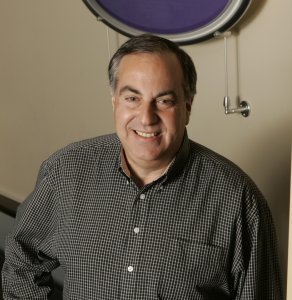
Mitch Golub, president, Cars.com
Photo: Cars.com
Miami, Florida—Terra.com, and Cars.com have teamed up to reach Spanish dominant Latino online consumers. As part of the effort, Cars.com’s complete inventory of more than two million new and used vehicles will appear on Terra’s automotive channel. The two companies hope to attract U.S. Hispanics who prefer to surf the web in Spanish with car related content, tools and services; and provide advertising options for marketers looking to tap into the coveted Hispanic segment. Terra will also feature Cars.com’s private-party listing service, Sell It Yourself.
“Earlier this year, we launched our Spanish-language site, allowing our visitors to search for used cars in Spanish”, said Mitch Golub, president, Cars.com. “In working with Terra.com we are building on our strategy to meet the needs of Spanish-speaking car shoppers.”
The companies believe the Internet offers buyers freedom to search and browse at their own convenience and customize information to fit their needs. In making their Spanish language marketing decision they relied on a recent Synovate survey indicating that more than two-thirds of Hispanic Americans they surveyed identify the Internet as the best resource for making purchase decisions. According to Terra.com, 60 percent of its visitors are online daily and 84 percent rate the Internet as the best media source for automotive information.
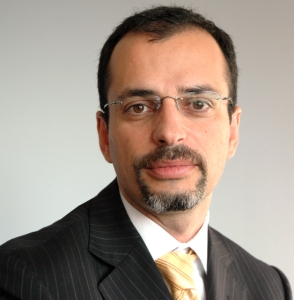
Fernando Rodriguez, chief executive officer, Terra Networks USA
“Through our partnership with Cars.com, Terra’s visitors can readily search millions of new- and used-car listings and access robust, easy-to-use tools that help them research, locate and purchase the vehicle they want,” said Fernando Rodriguez, chief executive officer, Terra Networks USA.
Terra Networks is a global Internet group with a presence in the U.S. and Latin America. The group operates websites in the United States, Spain and Latin America. Terra.com is the U.S. Hispanic arm of the Terra Networks group, providing a portal and services to Spanish speaking users.
Cars.com is partnered with more than 200 metro newspapers, television stations and their websites, and advertises vehicles on behalf of 13,000 dealers, classified advertisers and private parties. The company website offers inventory search tools and new car configuration with pricing information, photo galleries, buying guides, comparison tools, original editorial content and reviews.
Reach Hispanics online today with
“Marketing to Hispanics Online” audio recording
Identifying and characterizing the booming Hispanic online market


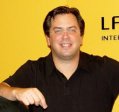
Joel Bary, Alex Carvallo and Matias Perel
Find out about
• The 16 million Latino online users
• Latino online users by gender
• What they do online
• Their language preferences
• How to reach Hispanic urban youth online
• What affects their online behavior
• What influences their purchases
Click here to purchase a recording on marketing to Hispanics online
Posted by Elena del Valle on June 5, 2007
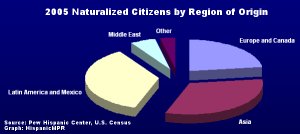
Click on image to enlarge
According to a Pew Hispanic Center analysis of U.S. Census Bureau’s March Supplement to the Current Population Survey and data from the federal Office of Immigration Statistics, the percentage of foreign born residents who became naturalized U.S. citizens increased significantly over the last 25 years. Their analysis indicates that while most naturalized citizens used to be from Europe; by 2005 there were 4.4 million naturalized citizens from Latin America. Latin America with just over one third of all naturalized citizens was the top region of origin for foreign born citizens.
At the same time, of the 8.5 million foreign born residents eligible for naturalization in 2005, 3 million were Mexican. From 1995 to 2005 the percent of Mexicans who became naturalized increased 144 percent, representing the highest increase from any country of origin.
The Center’s report indicates that in 2005 the United States had the highest historical number of naturalized citizens, 12.8 million. From the 1970s to the middle of the 1990s the average number of naturalizations jumped from 150,000 to 650,000. They believe the increase signifies a greater likelihood that eligible residents will choose to naturalize.
The number of unauthorized immigrants showed a conspicuous spike between 1995 and 2005. This means there were increases in the immigrant groups with the closest ties to the country, naturalized citizens, and those with the least attachment, unauthorized visitors.
The Pew Hispanic Center is a non profit initiative of the Pew Research Center. The mission of the Pew Hispanic Center is to improve understanding of the Hispanic population and chronicle their impact on the country.
Target Latinos effectively by anticipating changes in the market with
“Hispanic Projections” audio recording

Presenter Roger Selbert, Ph.D.
Find out
- About Latino buying power growth in the future
- How Latino market growth compares with other markets in the U.S.
- What drives the rise of Latino economic clout
- Who should target the Latino market
- What is the size of the Hispanic affluent market
- If the luxury Latino market is growing
- About Hispanics who earn more than $100,000 annually
Click here for details on “Hispanic Projections”
Posted by Elena del Valle on June 4, 2007
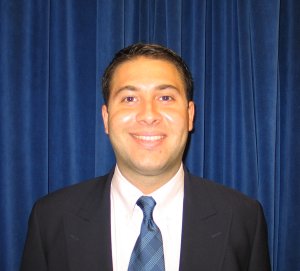
Federico A. de Jesús, director, Hispanic Communications
U.S. Senate Majority Leader Harry Reid’s office
Photo: Federico A. de Jesús
A podcast interview with Federico A. de Jesús, director, Hispanic Communications, U.S. Senate Majority Leader Harry Reid’s Office, is available in the Podcast Section of Hispanic Marketing & Public Relations, HispanicMPR.com. During the podcast, Federico discusses immigration reform issues with Elena del Valle, host of the HispanicMPR.com podcast.
Since March 2006 he has worked as spokesperson for Hispanic issues on behalf of the Leader and Senate Democrats. In 2003, he worked as press advisor for Hispanic Media Outreach for House Democratic Leader Nancy Pelosi in Washington, DC. During that time, he helped coordinate, draft and market the Democratic Hispanic Agenda Compromiso Demócrata con el Pueblo Latino, which was unveiled as the joint House/Senate Democratic vision for Hispanic American families.
In 2002, he was legislative correspondent, staff assistant and internship coordinator at Congressman Eliot Engel’s Washington, DC Office. Federico received a Bachelor’s degree from the School of Public Affairs at American University in Washington, DC.
To listen to the interview, scroll down until you see “Podcast” on the right hand side, then select “HMPR Federico A. de Jesús,” click on the play button below or download the MP3 file to your iPod or MP3 player to listen on the go, in your car or at home. To download it, click on the arrow of the recording you wish to copy and save to disk. The podcast will remain listed in the June 2007 section of the podcast archive.
“Emotional Branding: How to capture the heart and mind of the Hispanic consumer” audio recording


“Emotional Branding” was recorded January 2007 during the Strategic Research Institute 13th Annual Blockbuster Marketing to U.S. Hispanic and Latin America conference in Miami, Florida.
Receive a free downloadable copy by completing our Visitor Survey.
Click here
Click the button to hear the podcast:
Click here to sponsor a HispanicMPR.com podcast
Posted by Elena del Valle on June 1, 2007
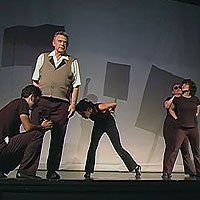
“Carlos Baron” performance
Photo: Haiku Films
San Francisco, California — California film producer and director Mabel Valdiviezo recently screened “Carlos Baron,” her latest production, on Spark, a KQED and PBS television show about Bay Area artists in San Francisco. The Spanish language film includes English subtitles.
In the 14-minute film, Carlos Baron, described as a Bay Area multicultural theatre evangelist, guides viewers on road trip to Chile to explore love and exile through the poetry of Pablo Neruda after the death of Augusto Pinochet, Chile’s former president . Shadow theatre, music and dance, are said to run a powerful link between Baron’s life and the Nobel poet that inspires his work.
Baron’s play, “Poeta Pan” or “Bread Poet” traces his Chilean roots through the poetry of Neruda. A collaboration with Latin jazz flutist John Calloway, Rafael Manriquez and choreographer Martha Zepeda, calls up comparisons between September 11, 2001 and the Pinochet coup d’etat that occurred 28 years earlier on the same date.
“The first day of production was a pivotal moment in the film. Carlos called me a few hours before the shoot to tell me that Pinochet had died that very morning. Everybody, including myself, was in an altered state when I started filming with my crew the run through rehearsal just before Carlos and his troupe headed to Chile,” said Valdiviezo.
“Why Neruda? It’s beautiful poetry; accessible and a voice of reason and peace in the midst of war atmosphere that exists today,” said Barón. “I want the audience to take away a sense of hope, the sense of collaboration that took place here, the sense that it is possible to do things in lean times.
Produced by Mabel Valdiviezo, “Carlos Baron” is a joint project of Spark and KQED. Valdiviezo is the founder of San Francisco based production company Haiku Films. Her short feature film, “Soledad Is Gone Forever,” was accepted to the Short Film Corner Cannes International Film Market in May 2007. Spark is a magazine TV Show that airs on KQED, a Public Broadcasting System television station.
“Emotional Branding: How to capture the heart and mind of the Hispanic consumer” audio recording


“Emotional Branding” was recorded January 2007 during the Strategic Research Institute 13th Annual Blockbuster Marketing to U.S. Hispanic and Latin America conference in Miami, Florida.
Receive a free downloadable copy by completing our Visitor Survey.
Click here























